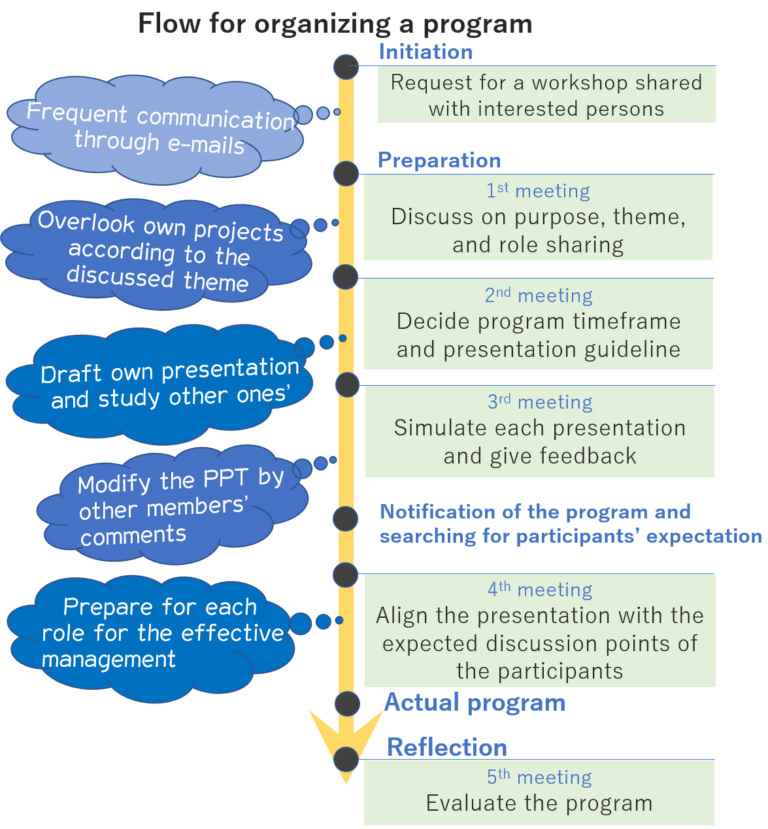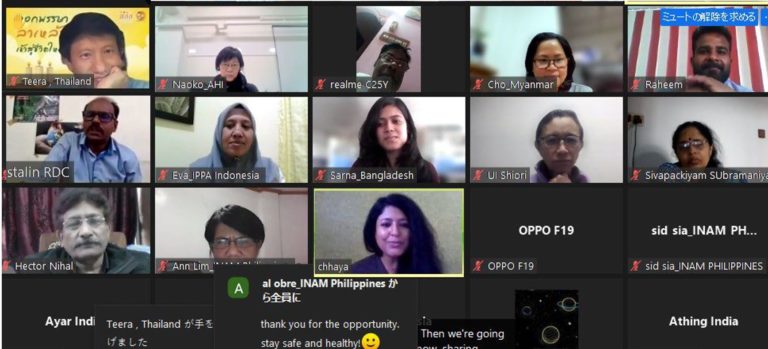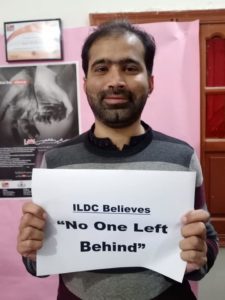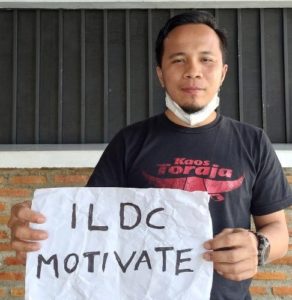Online case study session on ”My Application of Learning from ILDC” was held on Feb.9
Date & time: February 9, 2022 16:30-19:30 (JST) Format: Online (Zoom)
Participants: 44 Participants (AHI alumni and their working partners and AHI’s Japanese partners )
Objective
To have an opportunity where the participants discuss on shared topics and gain further learning.
Organized and presented by:
Mr. Md. Raheem Badurdeen (Berendina Development Services (Gte) Ltd. [BDS], Sri Lanka, ILDC2019)
Mr. Heng Chheangkim (ARV Users Association [AUA], Cambodia, ILDC2017)
Mr. Savariouradimi Josephstalin (Rural Development Council [RDC], Tamil Nadu, India, ILDC2019)
Ms. Chhaya Pachauli (Prayas, Rajasthan, India, ILDC2019)
Program
Presenters shared the following points;
i) A case of application of learnings from ILDC to his/her activities,
ii) Lessons learnt from i), and/or
iii) Difficulties which he/she is facing in i).
Each presentation was followed by QA.
Flow for organizing the program

"Through several times of preparatory meetings, we helped each other (e.g. making simplified PPT and checking speed of speaking). It's nice to associate, share and learn with other alumni.
It's your turn to organize the workshop!"

Case studies
Case 1:
Shifting Needs-based Approach (NBA) to Rights-based Approach (RBA) in Tea estate communities
Learning from ILDC:
Recognizing peoples needs as rights, Focus on process and outcome
Discussion highlights:
Organization has practiced NBA for over 30years. The community has been used with our services. However, in order to achieve the sustainable goal, we need to run RBA so that the community can identify the real issues, plan and do well with more participation. It’s important (and challenging) to make the community aware of their own rights and apply into real actions.
Case 2:
Volunteer-led support group for enhancing well-being of PLWHA and other marginalized people
Learning from ILDC:
Multi-sectoral collaboration “Inclusiveness”, Group forming process, Empowerment and Sustainability, Participatory Learning
Discussion highlights:
All sectors at community level such as commune council members, officers, health care providers, teachers as well as community people were invited to the planning meeting to organize inclusive SHG. The members (mostly women) of SHG implemented campaigns and public forums on rights, stigma, and discrimination. It’s challenging to strengthen collaboration with local level authorities who has less motivation in responding to HIV/AIDS issues.
Case 3:
Awareness on “rights” and “responsibilities” among the youth group members and capacity development for advocacy
Learning from ILDC:
Youth empowerment for human rights of tribal people
Discussion highlights:
I was very much inspired by a young co-participant during ILDC 2017. Youth are interested in learning. We decided to provide training to youth. Because RDC has worked with their parents and guardians through different development programs, they trusted us and sent their children to the youth committees. After training, youth members could identify and approach to the issues.
Case 4:
Revitalizing Village Health, Sanitation and Nutrition Committees (VHSNCs) through a modified orientation technique focusing on wider aspects of human rights and social justice
Learning from ILDC:
Comprehensive inter-linkages among different rights and grassroots problems, ‘Root Cause Analysis’
Discussion highlights:
The engagement of VHSNCs in village health issues had been low. Prayas provided the members a broader perspective on ‘rights’ making them more sensitised about ‘justice’. They became more active and vocal about their demands. Although there is still a challenge that the response from the bureaucracy to the raised demands is very slow, but we need to continue working without fear, with a lot of patient despite of frustration, and keep putting pressure on the government.
Comments on workshop
Participants:
- Interesting because the presentation was based on actual experience including present challenges.
- Learning platform in which we can learn from presentation and also QA.
- The key is building relationship. Start with what the community have. Be patient and sensitive. Dream with them!
- Discussion shed light on many aspects, which helped me to draw a holistic picture.
- Got ideas to apply in my case from the presenters’ lessons learnt.
Organizers:
- Learned from answering questions. While working, we don’t think in depth. But when we explain our activity, a lot of thinking is required.
- Preparation meetings made us understood on each case and feel confident about management on the day. Such process remind me of ILDC!
- Wish to have more active discussion for each case, especially on challenges, not only QA.
- This session realized me of the importance of the audiences’ environment.

- Categories
- Learning Community


